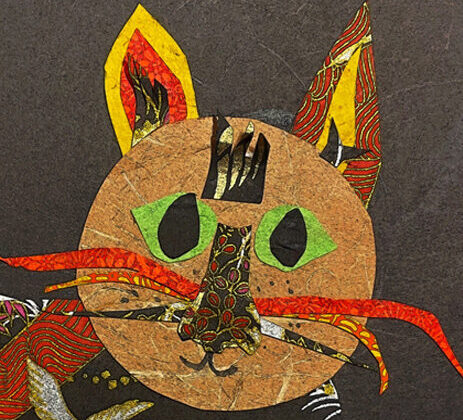Gary Lebel
FOR ABRAHAM & RUTH
‘Dawn finds us beside the tired lamp drawing on paper, awkwardly, with effort, ships mermaids or seashells;’ George Seféris, from Mythical Story
Rereading George Seféris’ series of poems called ‘Mythical Story’, I pause to think of Abraham and Ruth who are as indelible in my mind as the reddish tinge that iron leaves on stone. Married for some sixty years, they were a paradigm of love and devotion, of arguments and petty bickering at times, of course, but living and working as artists side-by-side along the coast of Maine through all those lush springs, halcyon summers and bittersweet autumns, harbored snugly together while warmed by a wood stove through the leaden silence of many snows.
When young, they’d strolled the Left Bank, bought small cubist sketches by a then-relatively unknown Georges Braque, and they could already see and feel the excitement of being on the cusp of where modern art was leading, that when compared to the pace of previous centuries, was moving now at the dizzying speed of light.
But as all true artists should and must, they followed their own paths to the canvas, she extolling their ruggedly handsome coast, and he its sailing ships in visions of a much older, seafaring coast that was rapidly disappearing, as eager and perhaps as desperate to sing its praises as Edward Curtis had when he decried the decimation of the nation’s indigenous Americans and sought to preserve what he could of their noble faces, their spirit-worlds of deserts, canyons, plains and mesas. . . where a terrible silence staggers on in the wake of the blood we let, the crimes we whites committed for which we’ve never atoned. Never.
When on-shift at the nursing home where they shared a private room, I’d often see Abe stoop-shouldered drawing mainsails, mizzens and bowsprits alone at the dining room table with a pencil, sketching them out on paper napkins, his Ruth too ill with diabetes and arthritis to ever leave her bed let alone wield a brush again. When I reported to work after high school classes as an orderly, they would always greet me warmly whenever I entered their room.
How often I tried to picture their youthful faces beneath their aged ones, at times thinking—foolishly—that I’d succeeded. And years later, after being caught up myself in the art and poetry of early twentieth century Paris, I took great joy in imagining them strolling and knocking about the City of Light in their twenties, inhaling its excitement, its energy, its artists’ thirst for relief and change after the horror of the First World War.
Even into her nineties, Ruth was still as sharp and articulate as a well-spoken woman of thirty, and she would herd her poor husband to her bedside to calm him, her life-long love in the throes of Alzheimer’s, always with patience and a tenderness I’ll never forget.
And there is something about caring for the elderly that changes you irrevocably, and now hovering at the edge of seventy myself, I regard what I had experienced then with a sense of what John Keats had called a “negative capability”, for how can one pinpoint one’s deepest influences or the sources of their personal philosophy and intuition? To attempt just that, I’ll wager, is why some of us write, sculpt and make paintings, as the desire for clarity has its pleasures and bitter disappointments, but also its unexpected epiphanies and timely revelations, and unsolvable mysteries.
Outside the women’s ward A rainy autumn day is ending Though lit by the smile of a teacher Nudging a cowlick from my eyes With her palsied fist
Author’s Note
The George Seféris verses quoted from Mythical Story were translated by Edmund Keeley and Philip Sherrard, Six Poets of Modern Greece, Alfred A. Knopf, New York, 1968
About the Author

Gary LeBel is an artist-poet living in the greater Atlanta area whose poems have appeared in journals throughout the USA, the UK, Japan, and India. He believes that art, or anything else worth doing, is a life-long pilgrimage.
